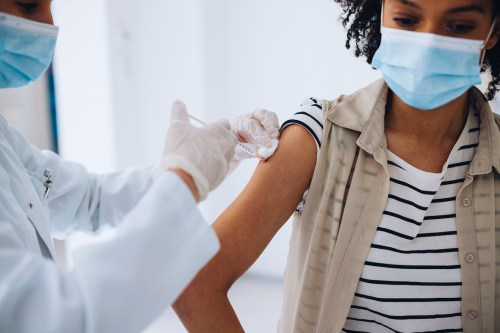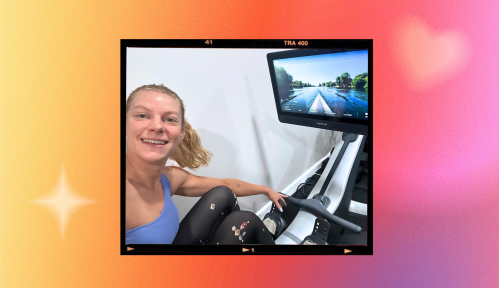For many people, getting the second dose of a COVID-19 vaccine is incredibly exciting. But it can also be confusing. On the one hand, full vaccination offers you significant protection. On the other, you may have heard that the second dose can make you feel unwell or you might be unsure what it even means for you in terms of your ability to resume a “normal” way of life.
Experts in This Article
biochemist, neurobiologist, antibody engineer, and senior scientist at GlaxoSmithKline.
It’s perfectly normal to feel anxious about the second shot or to be confused by what comes next. Do you need to take time off from work after your second shot, in case you get sick? Can you ditch your mask as soon as the second dose is administered? Below, the answers to these and other questions regarding the second dose of the Pfizer BioNTech and Moderna vaccines that require a second dose.
Your questions about the COVID-19 vaccine second dose, answered
1. How can I schedule my second dose?
Your second dose should be scheduled by the administrator of your first dose. If this is not the case, the Centers for Disease Control and Prevention (CDC) recommends reaching out to the administrator of your first dose for a second appointment.
2. When should I receive my second dose?
If you received the Pfizer BioNTech vaccine, your second dose should be scheduled three weeks after your initial dose. If you received the Moderna vaccine, your second dose should be scheduled four weeks after your initial dose. You should not get the second dose any earlier than recommended as data on efficacy prior to the prescribed second dose dates is limited.
3. What happens if my second dose is delayed or I miss my appointment?
You can still get your second dose within six weeks (42 days) after your first dose. After that, the data on efficacy is limited; however, the CDC does not recommend starting your vaccine course over with the first shot if you miss this window. Instead, proceed with your second shot (while noting that exact efficacy is unknown).
If you miss your scheduled appointment, you should reach out to the administrator of your first appointment to reschedule.
4. Do I need to bring anything to my second dose appointment?
Some requirement vary by state, but you should always bring the vaccination card given to you at your first dose appointment.
5. What happens if I lose my vaccination card?
The CDC recommends reaching out to the administrator of your first shot or your state health department for a copy of your vaccination card.
6. What should I do with my vaccination card after my second shot?
The CDC recommends keeping the hard copy on file somewhere and taking a picture of it to keep as well.
7. Will I feel sick after my second shot?
Responses to the second dose of the COVID-19 vaccine may vary, but they may be more intense than those experienced with the first shot. According to the CDC, possible side effects include soreness, pain, and swelling at the injection site and throughout the arm as well as fatigue, headaches, muscle pain, chills, fever, and nausea. While uncomfortable, these symptoms are typically nothing to worry about—they are simply a sign that your immune system is responding to the vaccine as desired. If your symptoms do not dissipate after a few days, however—or the redness/tenderness at your injection site gets worse after 24 hours—consult a medical professional.
Listen to a biochemist explain exactly how vaccines work:
8. What can I do or take to alleviate these symptoms?
According to the CDC, you can take over-the-counter medications such as ibuprofen, acetaminophen, aspirin, or antihistamines to relieve symptoms if you do not have a medical condition that otherwise prevents you from doing so. The organization also recommends using a cool, clean, wet washcloth on the injection site and, counterintuitively, exercising your vaccinated arm to relieve pain and soreness. You should hydrate as much as possible. Adequate sleep is also recommended.
9. Am I considered fully vaccinated after receiving my second shot?
You are not considered fully vaccinated against COVID-19 until two weeks after receiving your second dose of the vaccine.
10. What can I do once I’m fully vaccinated?
Once you are fully vaccinated (two weeks after your second shot), the CDC says it’s okay to gather indoors without masks with others who are also fully vaccinated. You can also gather indoors without masks with one other unvaccinated household, unless someone in that household is in a vulnerable category and at risk for serious COVID-19 illness. If you’re exposed to COVID-19, you do not need to quarantine unless you display symptoms or live in a group setting.
11. What can’t I do once I’m fully vaccinated?
According to the CDC, you should maintain safety protocols in public, such as social distancing and wearing a mask, or if you are gathering with unvaccinated people from more than one household, or if you’re visiting someone who is high-risk for severe COVID-19 illness who has not been vaccinated.
You should also continue to avoid medium to large gatherings, delay travel, follow your workplace protocol, and watch for COVID-19 symptoms. Though you are more protected in scenarios such as indoor dining or working out at the gym, the CDC cautions that these remain higher risk activities, especially if the number of unvaccinated people present is high, so precautions should remain in place.
If you’re unsure as to whether or not you can safely participate in an activity, the New York Times has created a tool that can help you weigh risks.
12. Am I 100% protected from COVID-19 after full vaccination?
No, but you are significantly protected. COVID-19 vaccines are highly effective at protecting against severe infection and death, and recent data suggests that the Moderna and Pfizer BioNTech vaccines are 90 percent effective at preventing infection altogether. Data is still being collected as to how effective they are against new variants of the virus, but this does not mean that they are ineffective at reducing or preventing illness from these strains. In other words, they will still protect you, but the exact degree to which they will do so is unknown.
13. Can I still spread the virus if I am fully vaccinated?
Early data shows that full vaccination may help prevent people from spreading the disease, but more intel is needed. For this reason, you should continue to consider the well-being of others as you make decisions about partaking in activities wherein you could potentially expose them.
Oh hi! You look like someone who loves free workouts, discounts for cult-fave wellness brands, and exclusive Well+Good content. Sign up for Well+, our online community of wellness insiders, and unlock your rewards instantly.
Sign Up for Our Daily Newsletter
Get all the latest in wellness, trends, food, fitness, beauty, and more delivered right to your inbox.
Got it, you've been added to our email list.











